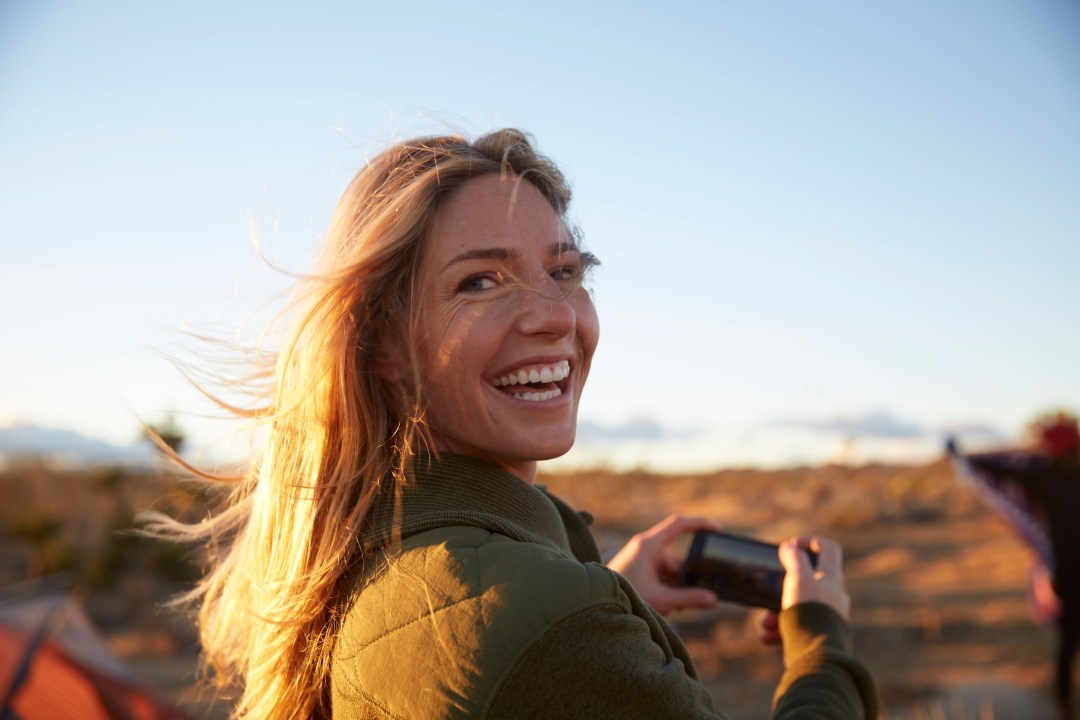The wild benefits of adventure
Do you feel that call of adventure, travel and the wild? Or are you afraid of stepping out of your comfort zone? A taste of adventure is just what we need to boost our energy, raise our spirits and grasp that summer feeling, writes Rebecca Frank. Here's why we should take the leap, and how to face your fears...

CLOSE YOUR EYES FOR MOMENT and think back to a time when youhad an adventure… Something that made you feel exhilarated, engaged and even a bit afraid! Maybe it was a holiday somewhere new and exciting, a physical challenge, such as running a marathon or climbing a mountain, or a weekend at a festival with a group of friends and no responsibilities. Remember how it made you feel – the emotions you experienced, as well as the physical sensations. Alive? Excited? Nervous? A bit giddy or childlike maybe?
It’s not been easy to adventure lately, but now there’s a whisper of opportunity in the air and the need to unleash our inner adventurer has never been greater. The word adventure often conjures up images of intrepid expeditions or high-risk adrenaline sports, but an adventure can be anything that involves an element of the unknown, a step outside your comfort zone and the habits and routines that we all live by. Whether you’re camping in your back garden or learning to kayak, it’s about crossing that threshold from familiarity into the uncharted.
Explorer Belinda Kirk says: ‘Adventure isn’t a luxury, it’s an innate part of being human. You don’t need to quit your job and cycle around the world or throw yourself off a cliff on a bungee jump to have a great adventure. A simple night walk to the top of a hill in the city or an evening around an open fire can be transformative. ’Kirk has spent 26 years taking others on intrepid endeavours, experienced her own transformation through adventure and is passionate about the metamorphosis that it can bring. ‘I’ve seen adventure change people of all ages and abilities and from all walks of life,’ she says. ‘I’ve seen it turn the timid into the confident, the addicted into the recovering and the lost into the intentionally wandering.’ My own most recent adventure involved an impromptu trip to the Dartington Estate in Devon.
Over a few days, I had several adventurous and memorable moments, from night canoeing on the River Dart and making my first lino print to showing my artwork and talking about my feelings with a bunch of strangers. All these events were both exciting and a little uncomfortable at points but, for the first time in a while, I felt like the old me, outside of my four walls, my daily routine and everything that is safe and familiar.
This transformation is something that Lou Rainbow, arts and crafts programme manager at Dartington Trust, regularly witnesses when running her creative courses. She describes people – and I firmly fall into this category – who don’t consider themselves to be artistic, for whom something has blocked that journey, often a throwaway comment or negative experience as a child.
“Sometimes, the things we think we fear are not real – they are things we’ve learned to fear, which might not reflect our true nature”
‘It helps to open up with something simple and bring people in gently,’ she says. She recounts leading others on a journey back to wellbeing through walking, drawing, making and swimming in the river. ‘We get people out walking, looking and listening, and it often wakes something in them that they’ve not experienced since childhood,’ she says.
‘People take a risk by coming here. They’re often on their own, which is scary, but doing that gives you a chance to be anonymous, but also yourself. It’s well known that if there’s too much in your head, it helps to get it out and into your hands.’
You only went and did it!
The sense of calm and happiness we often experience after doing something challenging while stepping out of our comfort zone is caused by our body’s response to stress and fear, explains Audrey Tang, a chartered psychologist and author of The Leader’s Guide To Resilience (Pearson, £14.99).
‘After an experience where the stress response has been triggered, and stopped, we release endorphins, the body’s natural pain relief, affording us a sense of calm. So, it’s not only the excitement of the event that gives us enjoyment but the relief that “we got there!” afterwards. Giving the brain a little healthy stimulation through adventure can be a great way to boost our mental wellness.’
When adventure calls, it’s like a niggle that won’t go away – maybe you keep researching campervans, watching adventure series or looking at old photos from your travelling days. When you get an idea or an invitation to do something or go somewhere out of the ordinary, it can feel as if a light has come on inside you, but there might also be a voice in your head offering reasons why you shouldn’t do it. Maybe the voice says ‘it’s too dangerous’, ‘I’m no good at that’ or ‘I haven’t got time’.
‘It’s worth remembering that sometimes the things we think we fear may not be real
– they are things we’ve learned to fear during our upbringing, even though this might not reflect our true nature,’ says Tang. ‘It’s important to surround yourself with encouragement and also have a safe space to fail, with a supportive guide. Another thing to remember is that it’s OK not to like it when you’ve tried it and you don’t have to do it again!’
Adventure can take many forms and doesn’t necessarily need to involve physical activity or being outdoors, although being in nature brings proven wellbeing benefits. An adventure, however, should involve some form of personal challenge.
The liberating unknown
There is an element of uncertainty in the most thrilling adventures, and this is where a smidgen of fear or anxiety may arise, and also some adversity that builds resilience, so you can cope better in hard times. It doesn’t need to be something totally new or out there – taking a step from your comfort zone into what Tang refers to as the ‘stretch zone’, where it’s a bit uncomfortable but manageable, can be less stressful than making sudden, giant leaps into the ‘panic zone’.
‘It’s like going from swimming to wild swimming, walking to climbing, glamping to wild camping,’ explains Kirk.
The after-effects of adventure go beyond the immediate feeling of achievement and satisfaction. It helps you build friendships and connections and also has an impact on other areas of your life, from parenting to how you behave at work, because your self-worth and confidence in your abilities increase. Kirk describes a calm acceptance that comes over people when they become absorbed in an activity, leaving normal life behind for a while. ‘It helps put our everyday struggles and worries into perspective,’ she says. ‘Our minds are alert for danger and when there is none, we end up worrying about everything and the future. The result is constant worry.’ This mellowing effect is something Rainbow also notices in students on her craft courses. ‘I see a change in people’s faces,’ she says.
Daredevil inside
Embarking on an adventure usually involves an element of risk. Some of us are naturally more risk-averse than others, in which case Tang says we need to surround ourselves with encouraging people who are helpful to us, rather than ‘naysayers and armchair critics’ who can destroy what little confidence we have to do something adventurous. ‘You know your comfort, stretch and panic zones – so you do you!’ she says. And, if you think you’re not the adventurous type, Kirk says there’s no such thing. ‘There’s an inner adventurer in all of us – sitting behind our desk, snuggling up on our sofa or stuck in a traffic jam, who might be yearning to get out and prove what we can do and who we are!’
belindakirk.com; dartington.org
Face your fears
Whether you’re afraid of failure or worry about what others might think, it’s usually fear that stops you trying something new. Use these techniques to challenge – and overcome – your concerns:
- Acknowledge the fear, and its role in alerting and preparing you, then move it to the back of your mind.
- Focus on the evidence, not what you imagine might happen – for example, the likelihood of dying during a bungee jump is far smaller than getting in a car.
- Visualise yourself trying something new and imagine the sense of achievement.
- Ask yourself, ‘What’s the worst that can happen?’
- Think about why you want to do something and what you hope to get out of the experience.
- If you feel anxious, try counting as a way of distracting your brain from whatever it is that you fear.
- Remember that courageous people are not fearless and fear is an essential part of being brave in life.
Next steps
READ: ‘Roam Alone: Inspiring Tales By Reluctant Solo Travellers’ (Bradt, £10.99)
A book of true stories from more than 40 ordinary people who have taken the plunge and travelled alone, from teenage trips to granny gap years.
WATCH: ‘Into The Wild’ on Netflix. A beautiful portrayal of the real-life story of a young man who finished university, sold all his possessions and set out on a journey into the wilds of Alaska.
PLAN: an outdoor adventure. Try ‘nearly wild’ camping – a more secluded, quieter experience that’s almost untamed but not quite. Visit nearlywildcamping.org or check out the ‘Almost wild’ section of coolcamping.com.
BOOK: a short course where you learn a new skill and ideally stay away from home for at least a night. Have a look at the creative courses at dartington.org/whats-on








